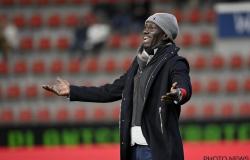Controversial comments
Present in Morocco for events linked to African Football, notably the draw for the women’s CAN and the final of the African Champions League, Patrice Motsepe uttered words which sparked considerable controversy. In a public speech, he declared: “As president of CAF, I encourage all countries, but I will certainly be happy, very happy, if Morocco reaches the final of CAN 2025 inchallah. »
These comments, expressed alongside Fouzi Lekjaa, president of the Royal Moroccan Football Federation (FRMF), fueled criticism of an alleged bias in favor of Morocco. Some observers did not fail to point out that this position is in contradiction with the neutrality that a president of a continental body must observe.
A clumsy attempt at justification
Aware of the impact of his words, Patrice Motsepe tried to nuance his speech by highlighting the inspiring role of Morocco in African football. He added: “Being a nation that unites and inspires is a moment of pride. For all of us. For Morocco, but also for all of Africa. (…) Moroccan football made history in Qatar, and when Morocco reached the semi-finals, it was a proud moment for everyone in Africa. »
However, this attempt at justification only added grist to the mill of his detractors, who consider that the CAF president is now openly displaying a preference for Morocco.
Favoritism perceived for several years
This is not the first time that CAF has been accused of bias in favor of Morocco. Under the leadership of Fouzi Lekjaa, the FRMF has multiplied organizational and sporting successes, consolidating Morocco’s position as a major player in African football. However, this success is seen by some as the result of effective lobbying rather than true fairness among African nations.
Motsepe’s statement also comes in a context where Fouzi Lekjaa is involved in several controversies, notably the Pegasus affair, a espionage scandal denounced by Algerian media. This tense context only fuels suspicions regarding relations between CAF and the FRMF.
Equity called into question
For many observers, Patrice Motsepe’s comments constitute an attack on the image of fairness that CAF must project. The organization, supposed to be an impartial arbiter, finds itself accused of taking sides, thus compromising the trust of other federations. While Morocco has undoubtedly played an important role in the evolution of African football, the CAF president’s statements should have reflected an overall recognition of the efforts of African nations rather than explicit support for any particular country.
In conclusion, Patrice Motsepe’s media outing in Morocco risks further tarnishing the image of CAF. The institution will have to redouble its efforts to restore confidence and guarantee truly equitable management of African football.





